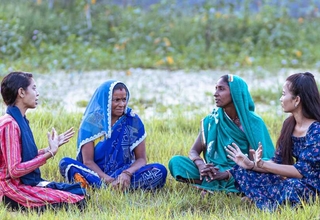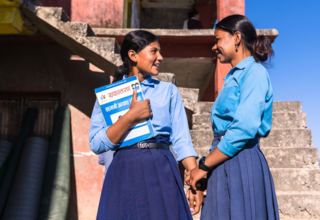Igroom Lama, a young woman from Nepal with support from the UNFPA, the United Nations Population Fund, attended the ECOSOC Youth forum in New York. This is her blog on her experience, reflecting on Nepali development and her recommendations for a successful post-2015 agenda.
The United Nations Economic and Social Council (ECOSOC) Youth Forum was held on 2-3 June 2014 in ECOSOC Chamber, UN Headquarters, NY. The main objectives of the forum were to bring the voice of youth into the discussion on addressing the challenges for meeting the Millennium Development Goals and shaping the future development agenda.
Being a woman and able to represent the youth issues of Nepal without the support of UNFPA would be impossible for me to attain the ECOSOC Youth Forum.
My focus for the forum was to ensure that the issues affecting Nepali youth are made mandatory for the post- 2015 framework to address. My other focus was to disseminate the information that I have gained from the forum among the Nepalese youth so that they could be assured that their contribution, their issues and voices to be listed in the post- 2015 agenda haven't been frittered away.
The conference schedule being very tight and specific, my main contribution for the forum was at the side events; on Governance and Participation. The key point that I made was about the role of youth advocating leaders to bridge the gap between the youths and the governance for development in Nepal. In Nepal, youth-led organizations have stepped up to encourage youth to be seen as leaders in the developmental process.
The Nepali context
Due to political instability Nepal hasn't been able to draft its Constitution which has led to further problems whilst also struggling to sustain itself in the economy cycle. The present developmental context is not satisfying. The unemployment rate is reaching its maximum where by the majority of unemployed are youths. Nepal's youth population is around 38.8% age group of 16-40 years (CBS report 2010). Political instability is leading to no new employment generation in the country. Many of the youths are forced to migrate to new cities.
These days, due to the inactive government but positive attitude of youth towards change, our youth leaders are actively involved in pulling those unutilized youth power into different productive works like voluntary and social works. Youths are being trained and consulted, changing their impression regarding all the failure of developmental work. They are given positive thoughts and many of the youths like myself are taking positive actions in knocking on the government's door to make a difference in the society.
Young people conducted Post 2015 consultations in 10 districts and 5 regions in Nepal. The journey was a success as was the charter produced and hand over event. The charter hand over was done by the Ministry of Youths and Sports to the National Planning Commission which signifies the important role that youth are already taking through active participation in policy implementation.
My Learnings and Recommendations
I always used to think that the issues of the developed and under developed countries were different because the word ‘developed' itself is striking. I considered that the problems of the youths were there but in small portion, but once I heard their issues at the forum, my assumptions were proved wrong. They too had problems that were faced by the under developed countries. The only difference was just to what degree their problems differ from the under developed countries.
The recommendations that I have from the Forum is that the formation of the post-2015 framework listens to every voice of youths that has been raised in the process because they represent the issues of their country. The youth are our future and developing development strategies without their involvement shall just be a waste.




